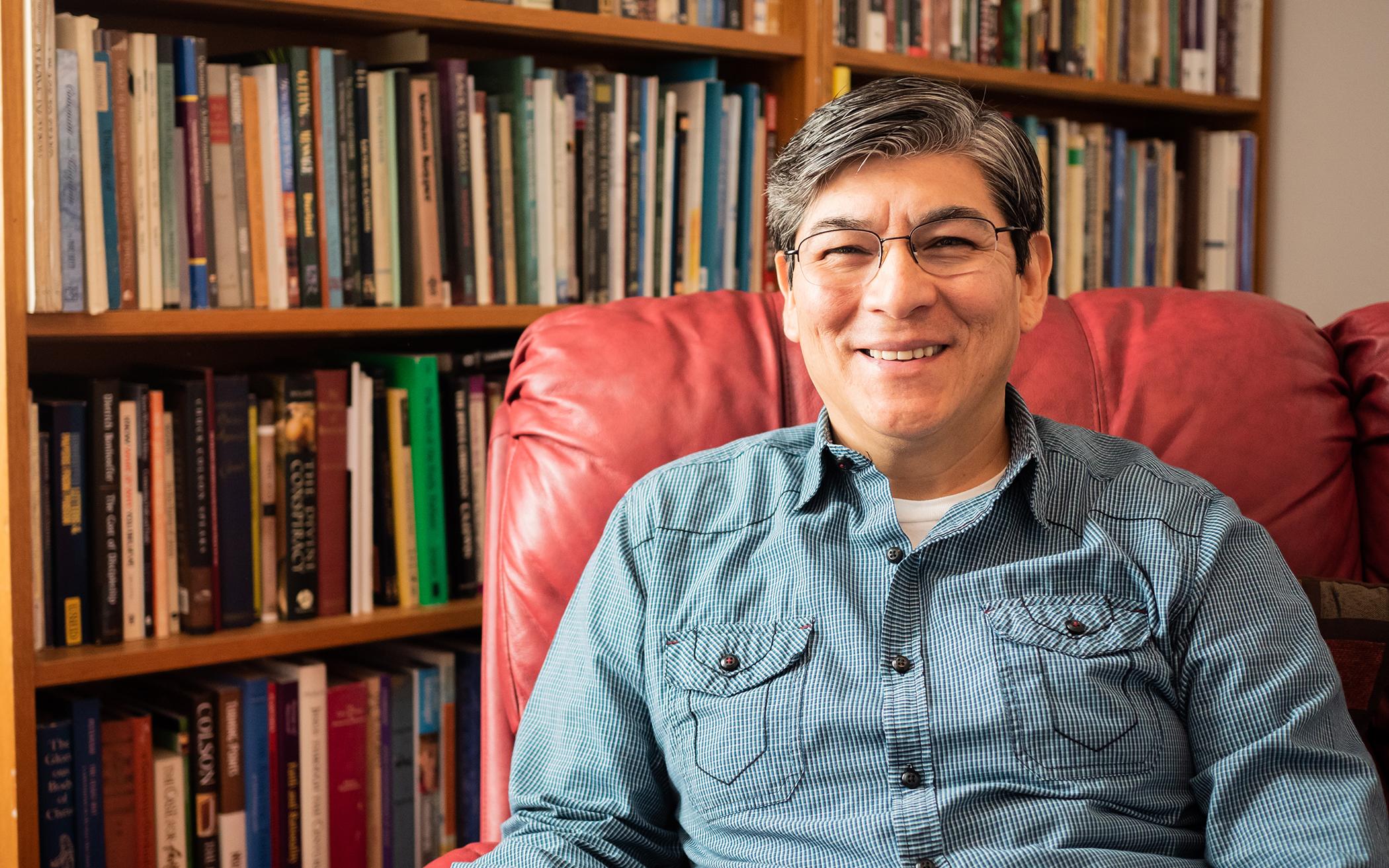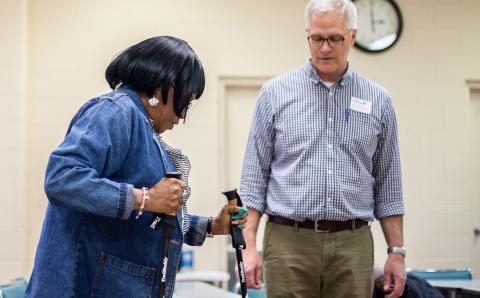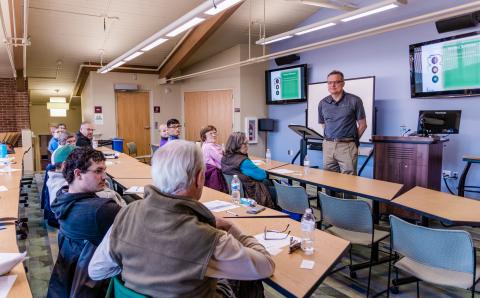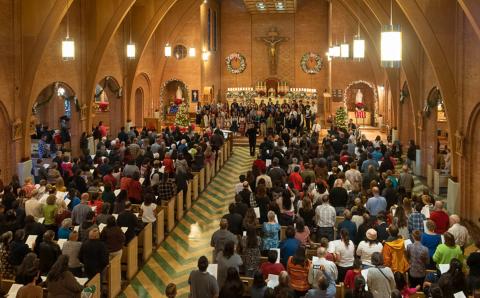An increasing number of Christian Reformed Church pastors are bivocational, earning income from both pastoring and a different job. For many, this second job is a way to pay bills. For others, their work outside of their congregation is a crucial component of their ministry.
“Pastors embody Christ, they share God’s love with conviction and with reverence, and they usher you into the space before God,” said Sam DeJong McCarron, a ministry vocational consultant for the CRC’s Pastor Church Resources. “That can be in a hospital room, in a Starbucks or in a grocery store. I think the biggest challenge is that it’s not just on Sunday morning.”
One of the largest groups of bivocational pastors within the Christian Reformed Church in North America (CRCNA) are church planters. As many classes and churches seek to plant a church, they recognize that bivocational pastors can be a financially sustainable way to bring a robust gospel to their communities. In fact, about 45 percent of church planters associated with Resonate Global Mission, the mission agency of the CRC, work an additional job outside of their church.
But pastoring a church while working another job is demanding. Here are a few stories of bivocational pastors.
How do you sustain a church financially?
“Church planting is hard. It’s even harder if you’re trying to reach those outside of the church,” said Joe Paravisini, a software engineer and pastor of The Neighborhood in Providence, R.I.
Many people in the community have little or no understanding of what it means to follow Jesus and be part of a church family, Paravisini noted, and many families in his church plant’s neighborhood also struggle financially.
“Less than half of the households have both parents around, with a majority being single working mothers of several children,” he said. “Planting a church here means understanding that the local giving will always be a struggle, so finding ways to supplement that is important.”
Paravisini’s career as a software engineer supports his family. That means funds given toward the church plant can be directed to other aspects of its ministry. “I can afford to slow down and walk with people on God’s time since there is no ticking clock on a budget running out,” he said.
But it’s more than finances that keep Paravisini bivocational in this season. He cherishes his software engineer job for the people he’s met and the relationships he’s formed with his coworkers and clients.
How do you engage the community?
“Identifying to people outside the church as a pastor can put people’s guard up,” said John Vanderstoep, pastor of The Bridge, a church planted with Resonate’s support in Fergus, Ontario. He’s also a realtor.
“There are so many people who are just very guarded about Christianity for a host of reasons,” said Vanderstoep. He said they may have been hurt by the church or they may have found Christians to be judgmental or close-minded.
“When I’m not first a pastor to people but a realtor, then that helps them to be a little more relaxed,” said Vanderstoep.
He recently officiated a wedding for a couple—she had been raised in the church, but her partner had not. “He wasn’t interested in the church,” said Vanderstoep, “but they asked me if I could do the wedding, and I did.”
Now, the couple is working with him to find a house.
“I see a curiosity he has about Jesus,” said Vanderstoep. “He might not invite me to regularly meet with him as a pastor, but as a realtor, I’m meeting with him regularly. Sometimes, our conversations move over to some of his curiosities … because [he’s working with me,] it gives him space to be in conversation with me without him feeling like he’s going to a pastor. You never know how God is going to set up relationships.”
How do you raise up leaders in a congregation?
This is also something pastor Karlos Palacios appreciates about being bivocational.
“There are people stepping ahead all the time,” said Palacios, a university professor and pastor of Iglesia Cristiana Reformada Comunidad de Fe Poinciana in Poinciana, Florida. “They’re not waiting for the pastor to tell them what they have to do.”
Palacios trusts that God did not send him to plant a church alone, but sent many believers to work alongside him. When a need arises while Palacios is busy working outside of the church, he said it’s not a problem because someone from the church is ready to assist. He’s thankful for the members who commit to pray for the church, help with administration, feed people living on the streets, visit people in the hospital, and empower the church’s young people to serve.
“I was very intentional finding those gifts in them and meeting with them,” he said. “I taught them what it means to be the church and encouraged them to serve God’s kingdom with their gifts and talents.”
How do you bring the gospel to the church’s community?
When Mirtha Villafane reflects on being a bivocational pastor, she points to the opportunities it provides for her to exemplify Christ in her community.
“Church is not only on Sundays or in the church building,” said Villafane, pastor of Latino American CRC in Anaheim, Calif. As the Hispanic ministry developer for Classis Greater Los Angeles and a local mission leader for Resonate, Villafane is involved in many roles dedicated to seeing the Latino community in Southern California thrive.
“All my jobs are interconnected,” she said. “I love to do this. That’s one of the reasons I wear hat and hat and hat. . . . I want to see results.”
One of Villafane’s focuses is training and equipping leaders. She works closely with a leadership team at Latino American CRC to oversee the church’s ministry. She said her other roles connect her with many resources that are helpful to her church members and enable creativity in their shared ministry.
“I’d like to see many people in ministry and changing the Latino community,” she said. “That’s a dream.”
What are the challenges moving forward?
Whether it’s in a church building, and office, a university classroom, or a cigar shop, pastors are passionate about their callings to ministry. But being bivocational doesn’t come without challenges.
“I am limited in how many conferences I can attend, how many meetings I can participate in or hold, how much reading and prep work I can do,” said Paravisini. “There is not enough time, and some of the best hours of the day are given to my place of employment. It is exhausting to work at two jobs with the same level of passion and energy.”
“Ministry jobs are never half time,” said DeJong McCarron. “No matter what, it’s living inside you and in your person. We’re all called to live out our identity in Christ where God calls us.”
Resonate strives to support bivocational church planters wherever they are called—not just with funding for a building and Sunday worship, but also with coaching and training opportunities for pastors. But supporting bivocational church planters is an ongoing conversation within Resonate and the denomination.
“I think the issue is one of expectation,” said Kevin Schutte, who leads Resonate’s church-planting initiative. “Bivocational church planters still have the expectation of a full-time church planter—both their own expectations and the expectation of the [denomination]. I think we need to have honest conversations with our [pastors] about what their expectations are so everybody at the table understands the process and expectation.”
About the Author
Cassie Westrate, Resonate Global Mission









